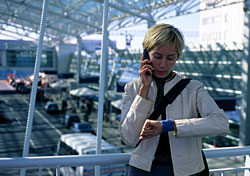
This summer has long been predicted to be the busiest for air travel in many years. With more planes filled to capacity, more travelers than ever before can expect to be denied boarding due to an oversold flight. Almost 56,000 passengers were bumped last year alone, and the final numbers for 2007 promise to be worse.
Since you’ll likely encounter airlines seeking volunteers to give up their seats in your travels this summer, you should arm yourself with information before you agree.
Why do airlines bump?
Airlines routinely oversell their flights to compensate for no-shows, which are frequently business travelers with refundable tickets. Compensation for passengers denied boarding costs the airlines less than a no-show, so airlines continue to overbook flights, despite the hassles it may cause passengers and front-line airline employees.
Voluntary bumping
Before bumping anyone against their will, airlines must first ask for volunteers. Typically, airlines will refund part of your ticket and offer a travel voucher valid for up to one year.
Before accepting an airline’s offer for a voluntary bump, be sure you have all the facts. Ask when the next flight is, and whether you’ll have a confirmed seat or be left on standby (and possibly stranded for longer than you’d like). If the next flight isn’t until the following day, find out if the carrier will pay for food, lodging, and ground transportation.
Be sure to also find out what, exactly, a “free ticket” constitutes. Ask if the ticket is valid on both domestic and international flights, if you can make reservations in advance, how long it is valid, if it has blackout dates, and if it is transferable to another person. Remember that compensation for voluntary bumps is at each airline’s discretion, so as a volunteer, you have bargaining power.
Involuntary bumping
The Department of Transportation (DOT) regulates compensation for involuntary bumping. First, in a written statement, the airline must outline passengers’ rights and bumping procedures.
If you are involuntarily bumped and the airline can get you to your destination within an hour of the scheduled arrival time, you aren’t entitled to any compensation. But, if you arrive within two hours on a domestic flight or within four on an international flight, the airline owes you an amount equal to your one-way fare, with a $200 maximum. If you’ll arrive more than two hours late on a domestic flight or more than four hours late on an international flight, or if the airline fails to make substitute arrangements for you, the airline must pay 200 percent of your fare, up to $400.
You also have the right to choose to make your own arrangements to your final destination, whether on another carrier or by other means of transportation. If you do so, you can request an involuntary refund for the flight from which you were bumped.
JetBlue is the only carrier that goes above and beyond DOT requirements. As part of its Customer Bill of Rights, JetBlue offers $1,000 to any passenger bumped involuntarily.
The DOT is now considering several new proposals that could affect compensation for involuntarily bumps, from causing limits to triple to eliminating them entirely.
How to avoid being bumped
Typically, the last passengers to check in and/or arrive at the departure gate are the first to be bumped involuntarily. Be sure to arrive at the airport with plenty of time to spare, and follow your airline’s time requirements. Generally speaking, most airlines require domestic passengers to check in at least 30 minutes before departure and arrive at the gate 15 minutes early, while for international flights travelers must check in at least 60 minutes in advance and arrive at the gate 30 minutes before departure. Of course, you should still check with your specific airline for exact requirements.
For more information on bumping, see Fly-Rights: A Consumer Guide to Air Travel published by the DOT, and don’t miss Ed Perkins’ latest column on the topic. Each airline outlines its bumping policy in its contract of carriage, and you can typically find these contracts on carriers’ websites. Earlier this year, The New York Times published an insider’s look at overbooking procedures at US Airways, an interesting read for anyone seeking more information on the topic.
We hand-pick everything we recommend and select items through testing and reviews. Some products are sent to us free of charge with no incentive to offer a favorable review. We offer our unbiased opinions and do not accept compensation to review products. All items are in stock and prices are accurate at the time of publication. If you buy something through our links, we may earn a commission.
Related
Top Fares From
Today's Top Travel Deals
Brought to you by ShermansTravel
France: 8-Night Paris, Avignon & Nice...
Infinity Worldwide Vacations
 vacation
$2880+
vacation
$2880+
Poconos: 3 Nts in Garden of...
ResortsAndLodges.com
 hotel
$305+
hotel
$305+
7-Nt Canada & New England Cruise,...
Princess Cruises
 cruise
$839+
cruise
$839+



